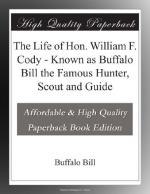“Of his courage there could be no question; it had been brought to the test on too many occasions to admit of a doubt. His skill in the use of the pistol and rifle was unerring; while his deportment was exactly the opposite of what might be expected from a man of his surroundings. It was entirely free from all bluster or bravado. He seldom spoke himself unless requested to do so. His conversation, strange to say, never bordered either on the vulgar or blasphemous. His influence among the frontiersmen was unbounded, his word was law; and many are the personal quarrels and disturbances which he has checked among his comrades by his simple announcement that ’This has gone far enough,’—if need be followed by the ominous warning that when persisted in or renewed the quarreler ’must settle it with me.’
“Wild Bill was anything but a quarrelsome man; yet no one but him could enumerate the many conflicts in which he had been engaged, and which had almost always resulted in the death of his adversary. I have a personal knowledge of at least half a dozen men whom he had at various times killed, one of these being at the time a member of my command. Others had been severely wounded, yet he always escaped unhurt.
“On the plains every man openly carries his belt with its invariable appendages, knife and revolver—often two of the latter. Wild Bill always carried two handsome ivory-handled revolvers of the large size; he was never seen without them.... Yet in all the many affairs of this kind in which Wild Bill has performed a part, and which have come to my knowledge, there was not a single instance in which the verdict of twelve fair-minded men would not have been pronounced in his favor.”
* * * * *
[Illustration: WILD BILL.]
Such is the faithful picture of Wild Bill as drawn by General Custer, who was a close observer and student of personal character, and under whom Wild Bill served as a scout.
The circumstances under which I first made his acquaintance and learned to know him well and to appreciate his manly character and kind-heartedness, were these. One of the teamsters in Lew. Simpson’s train was a surly, overbearing fellow, and took particular delight in bullying and tyrannizing over me, and one day while we were at dinner he asked me to do something for him. I did not start at once, and he gave me a slap in the face with the back of his hand,—knocking me off an ox-yoke on which I was sitting, and sending me sprawling on the ground. Jumping to my feet I picked up a camp kettle full of boiling coffee which was setting on the fire, and threw it at him. I hit him in the face, and the hot coffee gave him a severe scalding. He sprang for me with the ferocity of a tiger, and would undoubtedly have torn me to pieces, had it not been for the timely interference of my new-found friend, Wild Bill, who knocked the man down. As soon as he recovered himself, he




